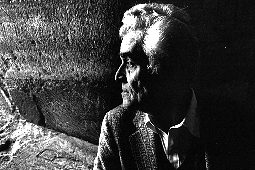 René Girard
René GirardInterview in Il Foglio March 20, 2007, Roma, by Giulio Meotti
Current thought is the castration of meaning. Such attempts to put man under discussion are perilous.”
“Christianity continues to suggest to us a fascinating and persuasive explanation of human evil. But we are losing the apocalyptic dimension of Christianity. People will realize that no society can survive without religion. Christian romanticism forgot that this religion before all else defused sacrificial violence. Today Christianity is much more realistic than the optimism of science that creates man only to kill him. The apocalypse is not the anger of God, but the madness of man upon himself. The apocalypse is not behind us, but in front of us. The apocalypse was not written for God, but for man. The Christian fundamentalists at present in America are apocalyptic in a mistaken sense; they think that God will punish man, not that man will punish himself. Today we need to have an apocalyptic view so as not to forget this violence originating in man.”
Islam lacks something important, the cross. The speech of Ratzinger at Regensburg, according to Girard, was decisive. “The challenge of Ratzinger launched against relativism is of benefit not only for Catholics, but for secularists. And I hope that Ratzinger may be a hope for Europe. He is a Pope very similar but also very different from JP II. Wojtyla was unstoppable, he always wanted to be seen and heard. Benedict XVI wants instead to reconcile people, he is very great teacher of reflection and modesty. The Christian religion, the greatest revolution in human history, uniquely reminds us of the correct use of reason. It is a challenge that plays on the concept of guilt. For a long time Europe decided that the Germans had to be the scapegoat. It was impossible, too, merely to set Nazism and Communism near each other. The death of god and the Enlightenment end of religious meaning decreed that it was necessary to maintain on its feet an ‘anti-God,’ an anti-divinity, Communism. I am in agreement with the thesis of Ernst Nolte on the affinity between Nazism and Communism. Every totalitarian regime began with the suppression of religious freedom. Today this anti-Genesis lives again in a part of science.” This is the meaning of the definition, from which he profits, of Henri de Lubac: ‘Atheistic humanism.’ “I was honored by his friendship. When I had been accused of not being a Christian, de Lubac told me that everything that I was writing was right and there wasn’t anything heretical in it. The great demographic crisis of Europe is one of the various signs of this paralysis. The ideology of our time is hostility to life as such. Modern culture deems that mythology, old and new, is in favor of life, while religion would be against it. It is the exact opposite. The new Dionysianism has a violent and mortal face. Thomas Mann was one of the first to understand it. Today a type of existential nausea rules, which is the heir of the romantic spleen.”
No comments:
Post a Comment